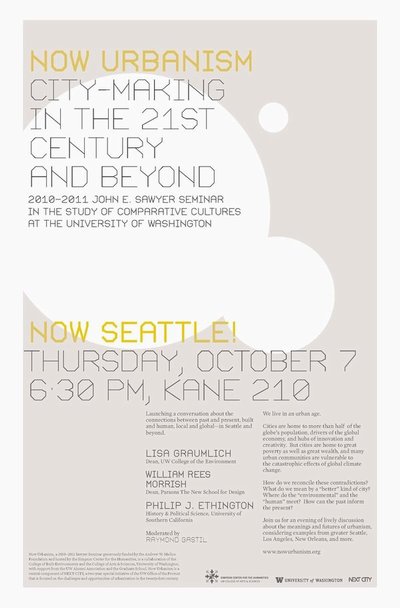September 30, 2010
‘Now Urbanism’ kicks off with panel discussion Oct. 7
Today, half of the world’s population lives in cities. By 2030, an additional five billion will have joined them.
Now Urbanism, sponsored by the UW, will focus on how to make urban areas function in healthy, humane ways. During a nine-month series of workshops, panel discussions and symposia, members of the University community and the Seattle region will examine urban life — both its problems and its causes for celebration.
“Now Urbanism” is also a central component of Next City, a two-year initiative led by the UW Office of the Provost and focused on challenges facing every large city.
The work begins at 6:30 p.m. Thursday, Oct. 7, in 210 Kane. Three experts on contemporary cities will participate in a panel discussion on the ways sustainability frames discussions about urban areas, including Seattle:
- William Morrish, dean of the School of Constructed Environments at Parsons The New School for Design, will speak on New Orleans post-Katrina and what it has to do with Seattle.
- Philip Ethington, professor of history and political science at the University of Southern California, will speak on “ruling regimes” in the Los Angeles Basin and what they have to do with Seattle.
- Lisa Graumlich, dean of the UW College of the Environment, will discuss ways the shared history of humans and nature could lead to a more sustainable future.
Ray Gastil, formerly city planning director for Seattle and now principal in Gastilworks Planning & Design, will moderate the panel.
Discussions that night and in the months following will address whether we citizens are operating in ignorance and denial. If so, what can we do? Should we accept the possibility of catastrophic surprises as in New Orleans, or are we moving to constructive alternatives?
Specifically, what could be done about problems regarding race, health, class, gender, shelter and immigration as they affect cities.
“Now Urbanism” is the 2010-11 John E. Sawyer Seminar in Comparative Cultures. Funded by the Andrew W. Mellon Foundation, it is organized by the College of Built environments and the College of Arts & Sciences with support from the Simpson Center for the Humanities, UW Alumni Foundation and the UW Graduate School.

